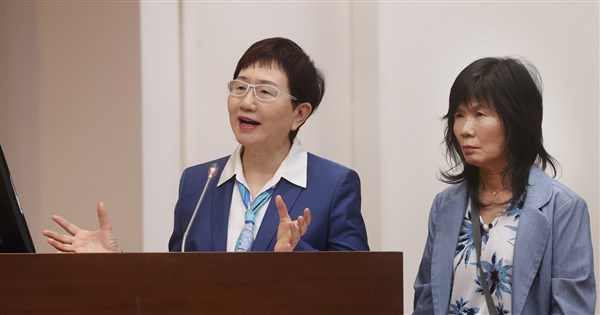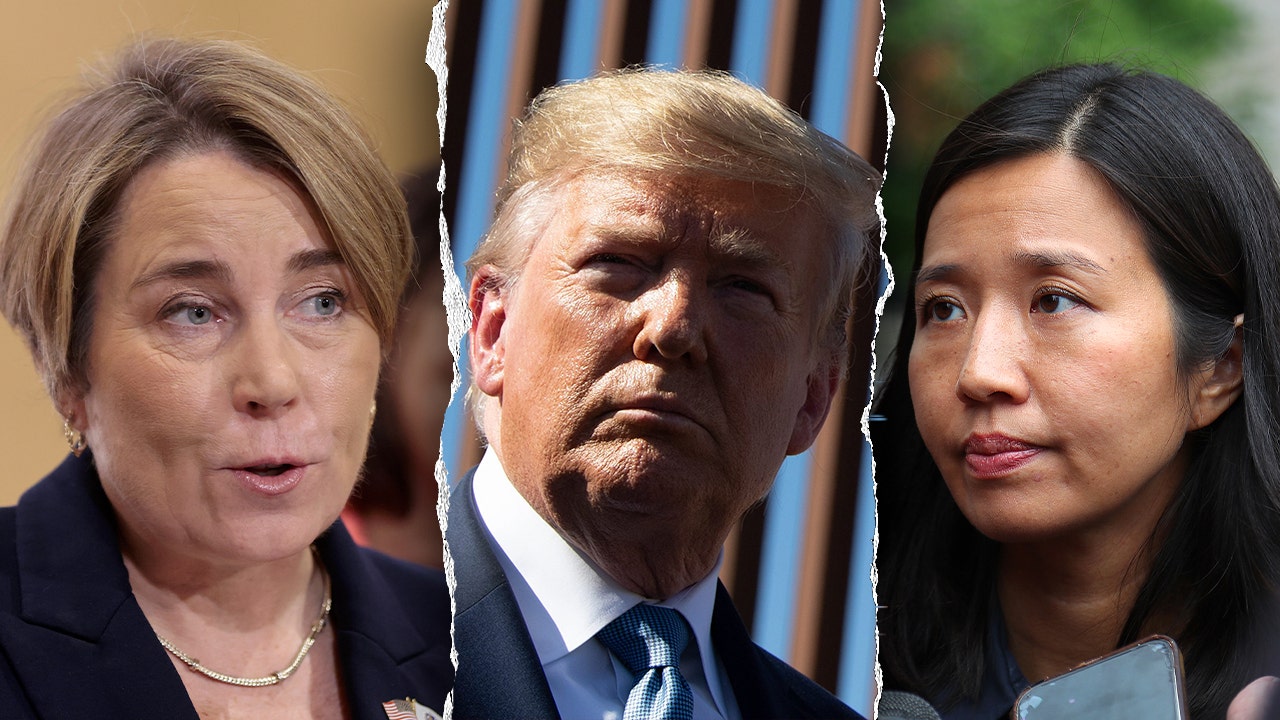Finance
Crypto Finance Partners with Figment to Enhance Its Staking Services for Institutional Clients

ZURICH, July 25, 2023 /PRNewswire/ — Crypto Finance, a pioneer in digital assets since 2017, trusted FINMA-regulated partner of financial institutions, and part of Deutsche Börse Group, announces its strategic partnership with Figment, a leading provider of staking infrastructure, to expand its protocol staking offering. The partnership combines Crypto Finance’s fully integrated platform with Figment’s complete staking architecture to create the optimal place for an institution to buy, store, manage, and stake ETH and other digital assets.
As a result of the integration, Crypto Finance’s clients can stake ETH, in addition to Cardano, Polkadot, and Solana. Staking ETH provides a unique opportunity for token holders to earn rewards. This solution allows institutional clients to receive the MEV-boosted rewards directly into their Crypto Finance segregated wallet, ensuring the highest level of security for staked assets throughout the entire end-to-end process. In addition, Figment’s SOC2 certified ETH architecture and “Safety over Liveness” approach minimises the risk of slashing.
By using the staking service of Crypto Finance, a FINMA-regulated institution, institutional clients can also benefit from inflation protection while claiming rewards for their active participation in a blockchain network’s proof-of-stake consensus mechanism. This strong partnership enables what is arguably the most competitive pricing approach offered by a regulated provider in the Swiss market. In addition, Crypto Finance remains the custodian of the assets throughout the whole staking lifecycle, ensuring security and control of assets.
The combination of Crypto Finance’s best-in-class security architecture and Figment’s expertise in optimising staking rewards and reliability creates a comprehensive solution that prioritises asset security, maximises returns, and ensures a trusted and dependable staking ecosystem for institutional clients.
Jan Brzezek, Founder and CEO of Crypto Finance, comments: “The partnership allows Crypto Finance to enhance its protocol staking offering by leveraging Figment’s leading staking infrastructure. Our institutional clients can now benefit from a more comprehensive, best performing, and most reliable staking partner and can potentially gain access to a broader range of staking networks beyond Ethereum. This expands their options for staking different digital assets and potentially earning staking rewards on multiple blockchains.”
Eva Lawrence, Head of EMEA at Figment, adds, “We are happy to announce our partnership with Deutsche Börse backed Crypto Finance as their only third party staking provider. Both Figment and Crypto Finance are focused on providing leading solutions in the digital asset space. Together we will enable Crypto Finance’s clients to generate secure and stable rewards for their customers and help fuel innovation and growth across Proof-of-Stake ecosystems.”
The staking integration is currently live and available to all Crypto Finance’s and Figment’s clients. To learn more, contact Figment or Crypto Finance.
About Figment
Figment is the leading provider of staking infrastructure with over $3B in total assets staked. On Ethereum, we are the largest non-custodial staking provider with nearly 5% of staked ETH on Figment validators. We provide the most comprehensive staking solution for over 250 institutional clients, including asset managers, exchanges, wallets, foundations, custodians, and large token holders, to earn rewards on their digital assets. These clients rely on Figment’s institutional staking service, including rapid API development, rewards reporting, partner integrations, and slashing protection. Figment is backed by industry experts, financial institutions, and our global team across twenty-three countries. This all leads to our mission to support the adoption, growth, and long-term success of the Web3 ecosystem. To learn more about Figment, please visit our website at figment.io
About Crypto Finance Group
Crypto Finance Group – part of Deutsche Börse Group and comprising two prudently FINMA-supervised financial institutions – offers professional digital asset solutions. This includes one of the first FINMA-approved securities firms with 24/7 brokerage services, custody, infrastructure, and tokenisation solutions for financial institutions. It also comprises the first FINMA-approved manager of collective assets for crypto assets, with a selection of crypto investment solutions, including the first FINMA-regulated crypto fund. With a team of nearly 120 employees, Crypto Finance Group is headquartered in Switzerland.
www.crypto-finance.com
Disclaimer
All information in this communication is provided for general information purposes. No information provided in this communication constitutes or is intended as investment advice. This communication is not, and is not intended as, an offer, recommendation, or solicitation to invest in financial instruments including crypto assets. Investments in crypto assets are high-risk investments with the risk of total loss of the investment. You should not invest in crypto assets unless you understand and can bear the risks involved. Crypto Finance is a financial group supervised by the Swiss Financial Market Supervisory Authority FINMA on a consolidated basis with Crypto Finance AG as securities company and Crypto Finance (Asset Management) AG as asset manager for collective investments with the corresponding FINMA licences. This communication and its content including any brand names, logos, designs, and trademarks and all related rights are the property of the Crypto Finance Group with Crypto Finance AG and its subsidiaries or third parties. They may not be reproduced or reused without their prior consent. This e-mail and any attachments are solely directed to the addressee. If you are not the intended recipient, please notify us.
General Disclaimer
Investments in virtual currencies are high-risk investments with the risk of total loss of the investment and you should not invest in virtual currencies unless you understand and can bear the risks involved with such investments. No information provided in this e-mail or any attachments shall constitute investment advice. Crypto Finance AG excludes its liability for any losses arising from the use of, or reliance on, information provided in this e-mail or any attachments. This e-mail and any attachments are confidential. If you are not the designated recipient, please notify the sender immediately by reply e-mail and destroy all copies (digital and paper). Any unauthorized disclosure, distribution, copying, storage or use of this message or any attachment is strictly prohibited and may be unlawful. There are risks in communicating by e-mail, such as data corruption, delay, interception, and unauthorized amendment for which we do not accept liability. Anyone who communicates with us by e-mail assumes such risks.
Media Inquiries Figment: [email protected]; Media Inquiries Crypto Finance Group: Jutta Holtkötter, [email protected], +41 41 552 45 82
SOURCE Figment

Finance
Cop29: $250bn climate finance offer from rich world an insult, critics say
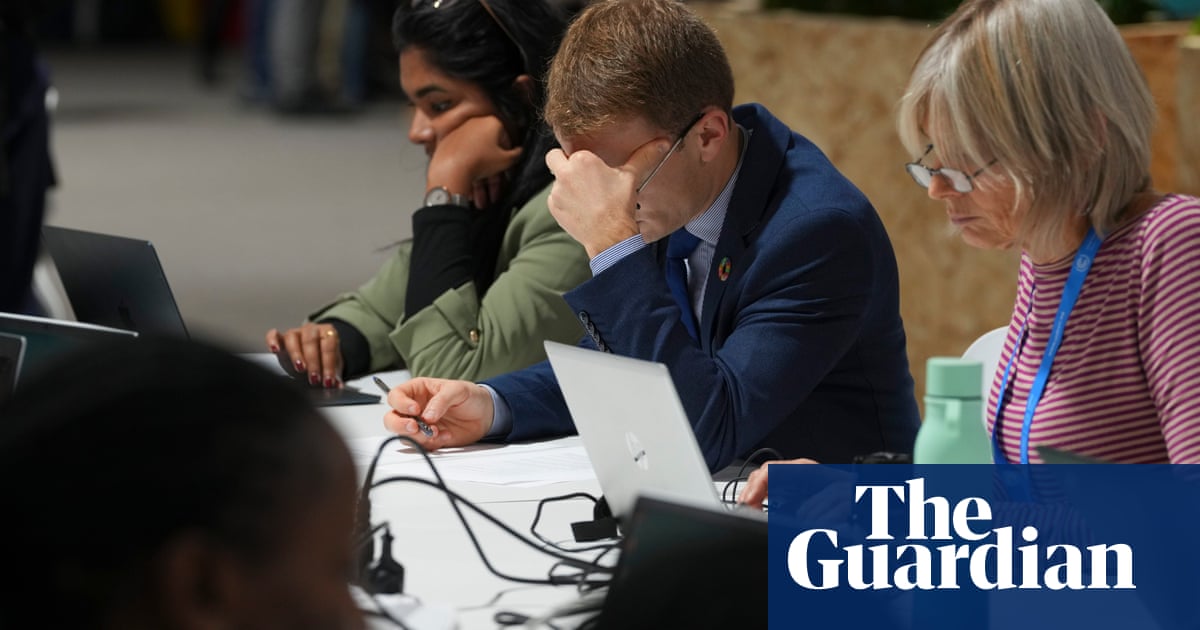
Developing countries have reacted angrily to an offer of $250bn in finance from the rich world – considerably less than they are demanding – to help them tackle the climate crisis.
The offer was contained in the draft text of an agreement published on Friday afternoon at the Cop29 climate summit in Azerbaijan, where talks are likely to carry on past a 6pm deadline.
Juan Carlos Monterrey Gómez, Panama’s climate envoy, told the Guardian: “This is definitely not enough. What we need is at least $5tn a year, but what we have asked for is just $1.3tn. That is 1% of global GDP. That should not be too much when you’re talking about saving the planet we all live on.”
He said $250bn divided among all the developing countries in need amounted to very little. “It comes to nothing when you split it. We have bills in the billions to pay after droughts and flooding. What the heck will $250bn do? It won’t put us on a path to 1.5C. More like 3C.”
According to the new text of a deal, developing countries would receive a total of at least $1.3tn a year in climate finance by 2035, which is in line with the demands most submitted before this two-week conference. That would be made up of the $250bn from developed countries, plus other sources of finance including private investment.
Poor nations wanted much more of the headline finance to come directly from rich countries, preferably in the form of grants rather than loans.
Civil society groups criticised the offer, variously describing it as “a joke”, “an embarrassment”, “an insult”, and the global north “playing poker with people’s lives”.
Mohamed Adow, a co-founder of Power Shift Africa, a thinktank, said: “Our expectations were low, but this is a slap in the face. No developing country will fall for this. It’s not clear what kind of trick the presidency is trying to pull. They’ve already disappointed everyone, but they have now angered and offended the developing world.”
The $250bn figure is significantly lower than the $300bn-a-year offer that some developed countries were mulling at the talks, to the Guardian’s knowledge.
The offer from developed countries, funded from their national budgets and overseas aid, is supposed to form the inner core of a “layered” finance settlement, accompanied by a middle layer of new forms of finance such as new taxes on fossil fuels and high-carbon activities, carbon trading and “innovative” forms of finance; and an outermost layer of investment from the private sector, into projects such as solar and windfarms.
These layers would add up to $1.3tn a year, which is the amount that economists have calculated is needed in external finance for developing countries to tackle the climate crisis. Many activists have demanded more: figures of $5tn or $7tn a year have been put forward by some groups, based on the historical responsibilities of developed countries for causing the climate crisis.
after newsletter promotion
This latest text is the second from an increasingly embattled Cop presidency. Azerbaijan was widely criticised for its first draft on Thursday.
There will now be further negotiations among countries and possibly a new or several new iterations of this draft text.
Avinash Persaud, a former adviser to the Barbados prime minister, Mia Mottley, and now an adviser to the president of the Inter-American Bank, said: “There is no deal to come out of Baku that will not leave a bad taste in everyone’s mouth, but we are within sight of a landing zone for the first time all year.”
Finance
US Treasury Selects BNY as Financial Agent for Direct Express Program | PYMNTS.com

The Bank of New York Mellon (BNY) will serve as the financial agent for the Direct Express program, which provides 3.4 million Americans with a prepaid debit card to receive monthly federal benefits.
The U.S. Department of the Treasury’s Bureau of the Fiscal Service said in a Thursday (Nov. 21) press release that it selected BNY for this role after evaluating proposals from multiple financial institutions and seeing the bank’s offering of features and customer service options.
The new agreement will begin Jan. 3 and will last five years, according to the release.
“Since 2008, the Direct Express program has paid federal beneficiaries seamlessly, inclusively and securely, while sparing taxpayers and customers the costs and risk associated with cashing paper checks,” Fiscal Service Commissioner Tim Gribben said in the release. “This new agreement will further our goals of delivering a modern customer experience and strengthening Treasury’s commitment to paying the right person, in the right amount, at the right time.”
With this agreement, BNY will add to the cardholder experience features like online/digital funds access, bill pay, cardless ATM access, omnichannel chat and text customer service, online dispute filing and in-person authentication options, the bank said in a Thursday press release.
“Drawing on our leading platform capabilities, we look forward to advancing the program’s goal of providing high-quality financial services to individuals and communities throughout the U.S.,” Jennifer Barker, global head of treasury services and depositary receipts at BNY, said in the release.
Seventy-seven percent of the recipients of disbursements opt for instant payments when given the option, according to the PYMNTS Intelligence and Ingo Payments collaboration, “Measuring Consumers’ Growing Interest in Instant Payouts.”
That’s because consumers looking for disbursements — paychecks, government payments, insurance settlements, investment earnings — want their money quickly, the report found.
In October, the Treasury Department credited the Office of Payment Integrity, within the Bureau of the Fiscal Service, with enhancing its fraud prevention capabilities and expanding offerings to new and existing customers.
The department said its “technology and data-driven” approach allowed it to prevent and recover more than $4 billion in fraud and improper payments, up from $652 million in 2023.
Finance
Islamic finance: a powerful solution for climate action – Greenpeace International

Across the globe, Muslim communities find themselves disproportionately affected by climate change, with extreme weather events, rising food insecurity, and other climate impacts taking a toll on their livelihoods, cultural practices, and spiritual life.
In the last few years, devastating floods swept through Pakistan, affecting millions, displacing thousands, and leaving entire communities struggling to rebuild. In Indonesia, one of the world’s most populous Muslim-majority countries, rising sea levels threaten to submerge coastal villages and erode vital agricultural lands. Meanwhile, in parts of the Middle East and North Africa, persistent droughts and water scarcity are increasing pressures on already fragile ecosystems and economies.
The climate crisis is having a profound impact on the daily lives and religious practices of millions of people
These climate pressures extend beyond immediate threats to survival. Climate change has also begun affecting food security in Muslim-majority regions, especially during Ramadan, a holy month where fasting is practised from dawn until dusk. In communities already grappling with the impacts of droughts or floods, maintaining food stocks for Ramadan can become a significant challenge. In Somalia, where cycles of drought and flash floods have eroded food systems, many families are forced to navigate long-standing shortages, with climate-induced shocks compounding existing vulnerabilities.
Food insecurity is a worsening crisis as global warming affects harvests, disrupts fisheries, and drives up food prices, making the observance of Ramadan particularly strenuous, both physically and economically. This brings climate change into the daily lives and religious practices of millions in profound ways, reminding us that the climate crisis is as much a social and economic issue as it is an environmental one.
Islamic finance: a financial system grounded in ethical responsibility
Islamic finance has been operating in the global financial system for decades, providing an ethical foundation rooted in Islamic principles that promote fairness, social responsibility, and environmental stewardship.

Ethical banking is a core pillar of Islamic finance. Through principles like zakat (charity) and waqf (endowment for public good), Islamic finance encourages financial activity that uplifts communities, supports sustainable projects, and avoids investments in industries harmful to people and the planet.
Many Islamic financial institutions in countries like Malaysia, the United Arab Emirates, and Saudi Arabia already support projects aimed at protecting the environment and enhancing social welfare. Success stories are already emerging. Malaysia’s green sukuk initiative has mobilised billions for renewable energy projects, while the UAE’s recent US$3.9 billion in green sukuk issuance demonstrates growing momentum. Saudi Arabia’s Vision 2030 has allocated US$50 billion for renewable initiatives, targeting an emissions reduction of 278 million tons by 2030.
A US$400 billion opportunity for climate action
While Islamic finance principles already provide a framework that aligns well with sustainability, there is still much room to strengthen its role in addressing the climate crisis, enhancing resilience in vulnerable communities, and shifting investments towards clean, renewable energy.
A new report by Greenpeace Middle East & North Africa (MENA) (as part of the Ummah For Earth Alliance) and the Global Ethical Finance Initiative (GEFI), highlights the transformative potential of Islamic finance in accelerating the global transition to renewable energy and addressing the triple planetary crisis: climate change, pollution, and biodiversity loss.
The report shows that the Islamic finance industry continues its robust expansion, with assets projected to reach USD$ 6.7 trillion by 2027, and that a strategic allocation of just 5% toward renewable energy and energy efficiency initiatives could mobilise approximately USD$ 400 billion by 2030 – a transformative sum for climate-vulnerable regions.
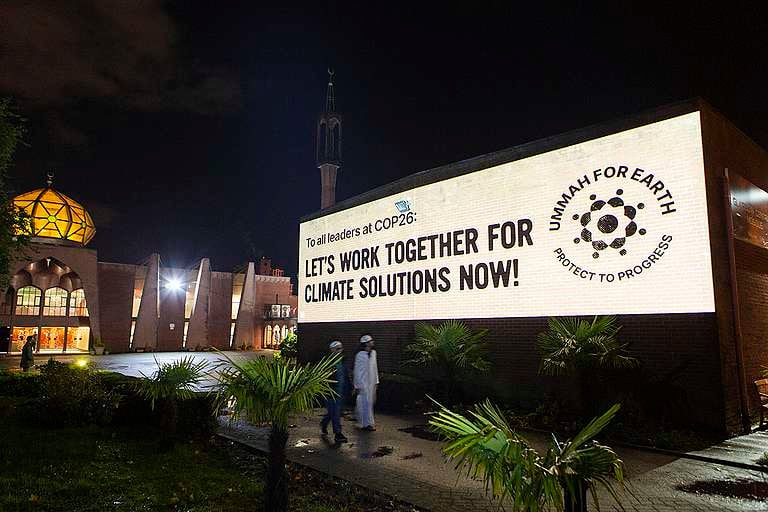
Islamic finance can help foster climate-resilient infrastructure, restore and protect biodiversity, and finance climate adaptation projects in at-risk communities. By explicitly directing funds away from fossil fuels and into green energy projects, Islamic financial institutions like the Islamic Development Bank (IsDB) can lead by example, especially in regions that are both vulnerable to climate impacts and hold significant influence in the global fossil fuel market. These institutions must accelerate their commitment to renewable energy investments.
As climate impacts intensify, Islamic finance offers a bridge between faith-based values and practical climate solutions. The convergence of Islamic finance and climate action represents more than a financial opportunity – it’s a moral imperative aligned with Islamic principles of environmental stewardship (khalifah) and balance (mizan).
Islamic finance, grounded in ethical principles and community responsibility, has a unique role to play in the global climate movement, particularly in the Global South. For millions across the globe, this form of finance offers a culturally relevant and powerful instrument to not only protect their communities from the worsening climate crisis but to promote environmental and economic sustainability in ways that align with their beliefs. Islamic finance offers a bridge between economic strength and ethical stewardship, creating pathways toward a more equitable and sustainable world for all.
Your voice can transform Islamic fiance
Ask your Islamic bank to support increasing investments in renewable energy!
Take action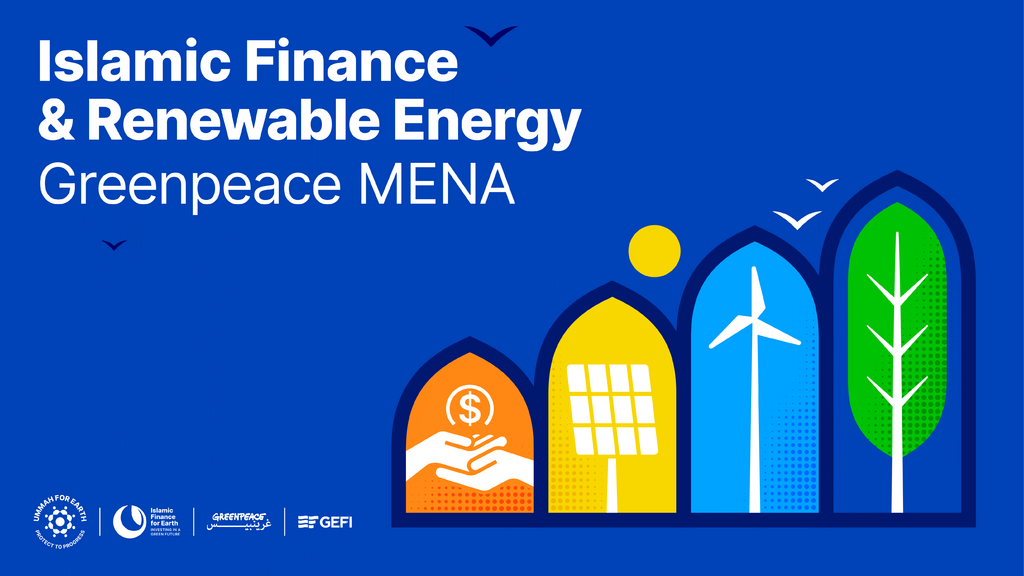
-
Business1 week ago
Column: OpenAI just scored a huge victory in a copyright case … or did it?
-

 Health1 week ago
Health1 week agoBird flu leaves teen in critical condition after country's first reported case
-

 Business5 days ago
Business5 days agoColumn: Molly White's message for journalists going freelance — be ready for the pitfalls
-
World1 week ago
Sarah Palin, NY Times Have Explored Settlement, as Judge Sets Defamation Retrial
-

 Science3 days ago
Science3 days agoTrump nominates Dr. Oz to head Medicare and Medicaid and help take on 'illness industrial complex'
-

 Politics4 days ago
Politics4 days agoTrump taps FCC member Brendan Carr to lead agency: 'Warrior for Free Speech'
-
/cdn.vox-cdn.com/uploads/chorus_asset/file/25739950/247386_Elon_Musk_Open_AI_CVirginia.jpg)
/cdn.vox-cdn.com/uploads/chorus_asset/file/25739950/247386_Elon_Musk_Open_AI_CVirginia.jpg) Technology4 days ago
Technology4 days agoInside Elon Musk’s messy breakup with OpenAI
-

 Lifestyle5 days ago
Lifestyle5 days agoSome in the U.S. farm industry are alarmed by Trump's embrace of RFK Jr. and tariffs

